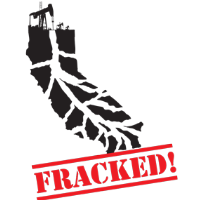Environmentalists Sue to Block State’s Rosy Fracking Report

California lawmakers finally got around to starting the process of regulating hydraulic fracturing (fracking) and other wildly popular oil and gas well stimulation techniques when it passed Senate Bill 4 at the end of 2013. A lot of people were worried about the toxic threat already posed by these barely-studied, uncharted drilling projects and wanted a moratorium until they could be assessed.
They lost that fight, but were given assurances that the environmental issues would be duly considered as part of the official Environmental Impact Report (EIR). To guarantee inclusion of the best scientific knowledge and assessments available, lawmakers scheduled its finalization six months after completion of a comprehensive, independent study.
That didn’t happen. The state Natural Resources Agency reportedly ordered that release of the scientific study be delayed six months, and it appeared (pdf) days after the final EIR was approved. Environmentalists howled that the EIR was deficient in many ways, some of which could have benefited mightily from the report that was ignored.
And then they sued.
The Center for Biological Diversity filed a complaint (pdf) Thursday asking the Sacramento County Superior Court to kill the EIR’s certification and stop the state from handing out well-stimulation permits based on it.
“We had a promise from the Legislature that we’d have a real scientific review and a real report, and they’d make a decision based on science, and that didn’t happen,” the Center’s Climate Law Institute Director Kassie Siegel told ThinkProgress.
The Center argued that the state blatantly violated SB 4 by not including the study in the EIR and it accused the Department of Gas, Oil and Geothermal Resources (DOGGR) of preparing a “fundamentally flawed draft EIR that ignored and downplayed the serious dangers of well stimulation.” The department then took a bad draft report full of “defects” and “compounded them” in the final document.
Most seriously, the lawsuit alleges, DOGGR went “so far as to claim that there is in fact no project to which the EIR is addressed.” Consequently:
“The EIR fails to adopt findings, fails to incorporate mitigation measures and/or alternatives into the project, fails to adopt a mitigation monitoring or reporting plan, and fails to include a statement of overriding considerations justifying the remaining significant and unavoidable impacts of the project.”
The Center thinks DOGGR is protecting the oil industry, a complaint about the department that has resounded all through the Jerry Brown years. In 2011, Governor Brown fired the acting director of the Department of Conservation and the head of DOGGR after the oil and gas industry complained that regulators were being too strict about enforcing U.S. fracking guidelines initiated in 2010.
“The EIR serves only as window dressing for DOGGR’s continued attempts to dismiss as inconsequential the serious damages and risks of well stimulation and continue business as usual for the oil industry,” the suit says.
The report, whose findings didn’t make it into the EIR, recommended that oil and gas development near homes, hospitals and schools be stopped. It warned of insufficient knowledge about the dangers of shallow fracking, used by 75% of the state’s frackers, and recommended that it be halted until more was known. Siegel told ThinkProgress there was “no way” the state could certify them safe.
The report also pointed out that toxicity in more than half the chemicals used in fracking is “uninvestigated, unmeasured and unknown. Basic information about how these chemicals would move through the environment does not exist.”
Recycled oil wastewater—a lot is produced during the drilling—is used to irrigate nearby crops, but the report said testing is inadequate. More than half the wastewater is stored in unlined pits, and can leach into the ground. “The hazardous levels of contaminants . . . cannot be ruled out.”
–Ken Broder
To Learn More:
Environmental Group Sues California over "Fundamentally Flawed" Fracking Report (by Katie Valentine, ThinkProgress)
Brown Administration Sued for Ignoring Risk Report on Fracking (Center for Biological Diversity)
State’s Independent Science Report Warns about Fracking's Known Unknowns (by Ken Broder, AllGov California)
An Independent Scientific Assessment of Well Stimulation in California (California Council on Science and Technology Lawrence Berkeley National Laboratory) (pdf)
Center for Biological Diversity v. California Department of Conservation, Division of Oil, Gas and Geothermal Resources, et al (Sacramento County Superior Court) (pdf)
- Top Stories
- Controversies
- Where is the Money Going?
- California and the Nation
- Appointments and Resignations
- Unusual News
- Latest News
- California Forbids U.S. Immigration Agents from Pretending to be Police
- California Lawmakers Urged to Strip “Self-Dealing” Tax Board of Its Duties
- Big Oil’s Grip on California
- Santa Cruz Police See Homeland Security Betrayal in Use of Gang Roundup as Cover for Immigration Raid
- Oil Companies Face Deadline to Stop Polluting California Groundwater





